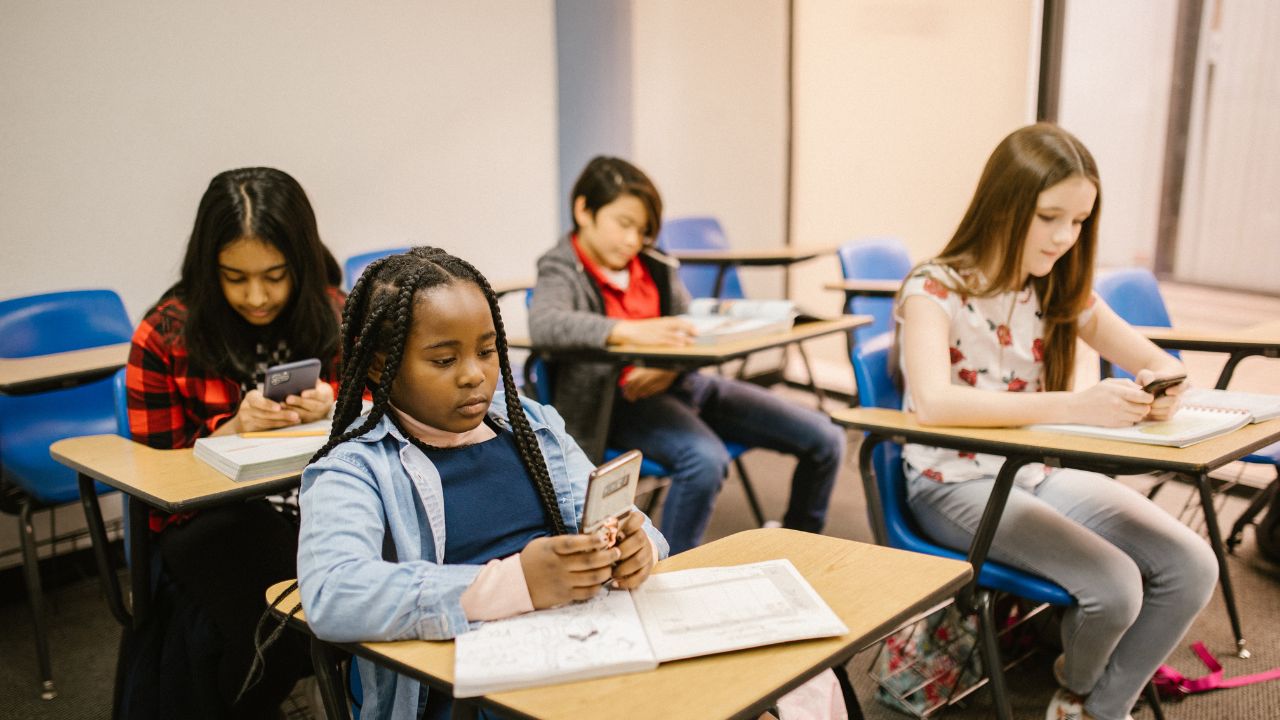
Post by : Zayd Kamal
In the rapidly evolving educational landscape of the UAE, a significant concern has emerged: parents in UAE out to limit smartphone use by students. With technology integrated into daily life and learning, parents are increasingly worried about the effects of excessive smartphone use on their children. This article explores the reasons behind this concern, the consequences of overuse, and the proactive measures parents are taking to address this issue.
Smartphones have become an integral part of modern life, acting as powerful tools for communication, education, and entertainment. In the UAE, where digital connectivity is exceptionally high, students often find themselves with unfettered access to their devices. While technology can significantly enhance learning experiences, it also poses risks such as distractions, addiction, and various health issues. Parents are observing alarming patterns in their children's smartphone usage, where screen time frequently takes precedence over academics and interpersonal relationships. Studies conducted by the UAE Ministry of Education reveal that excessive smartphone use can negatively impact students' academic performance and social skills, raising alarm among concerned parents.
The consequences of excessive smartphone use are multifaceted and far-reaching. One of the primary concerns is its impact on academic performance. Students who spend considerable time on their devices often struggle to concentrate on their studies, as notifications from social media and games divert their attention away from homework and reading. Moreover, the health implications cannot be overlooked. Prolonged smartphone usage can lead to a host of physical issues, including eye strain, headaches, and sleep disturbances. The blue light emitted by screens is notorious for disrupting natural sleep cycles, making it difficult for students to achieve restful sleep, which is crucial for their overall well-being.
Additionally, parents worry about the decline in social skills as children increasingly rely on smartphones for communication. Face-to-face interactions may suffer as digital conversations take over, hindering the development of essential social abilities that are vital for success in both academic and personal realms. Mental health is another critical concern, with research indicating a correlation between excessive smartphone use and rising rates of anxiety, depression, and loneliness among adolescents. The emotional well-being of children in a technology-driven society has become a pressing issue for many families.
In response to these growing concerns, parents in UAE out to limit smartphone use by students are taking a variety of measures to mitigate the effects of technology on their children's lives. One of the most effective strategies is setting boundaries around smartphone usage. Many parents are implementing clear rules regarding when and how long their children can use their devices. For instance, some families designate specific times or areas in the home as "tech-free" zones, encouraging more meaningful interactions during meals or family gatherings. These rule s are designed to foster an environment where communication and bonding can flourish, free from the distractions of technology.
s are designed to foster an environment where communication and bonding can flourish, free from the distractions of technology.
Another proactive approach involves encouraging alternative activities that engage children without screens. Parents are promoting hobbies such as sports, arts and crafts, reading, and outdoor adventures as productive ways to reduce screen time. By offering diverse options for entertainment and creativity, families can help their children develop skills and interests that do not rely on smartphones, thus cultivating a more balanced lifestyle.
Education plays a crucial role in this conversation, with parents striving to teach their children about responsible smartphone use. By discussing the potential pitfalls of excessive screen time, parents aim to instill a sense of awareness and responsibility in their children. This educational approach empowers students to make informed choices about their smartphone habits, fostering a mindset of moderation.
Interestingly, some parents are leveraging technology itself to manage their children’s smartphone usage. Various applications allow parents to monitor and limit screen time, offering insights into their children’s digital behavior. These tools can serve as valuable resources for parents aiming to strike a balance between allowing access to technology and preventing overuse.
While parents play an essential role in regulating smartphone use, schools and educators in the UAE are also stepping up to tackle this issue. Many educational institutions are incorporating digital literacy programs into their curricula, teaching students about responsible technology use and the dangers associated with social media. These programs aim to equip students with the skills they need to navigate the digital landscape safely and effectively.
Additionally, some schools are encouraging students to participate in collaborative activities that emphasize face-to-face communication. By fostering skills such as teamwork and empathy, educators are helping students develop the interpersonal abilities necessary for success in both academic and social contexts. This holistic approach to education recognizes the importance of balancing digital engagement with essential life skills.
The challenge of balancing smartphone use with healthy habits remains a complex issue for parents in UAE out to limit smartphone use by students. The key to navigating this terrain lies in fostering a balanced approach that embraces technology while minimizing its negative effects. Parents are encouraged to engage in open discussions with their children about their digital experiences, helping them understand the benefits and drawbacks of technology.
Promoting healthy habits and alternative activities is crucial for creating a well-rounded lifestyle. Families can cultivate an environment that values meaningful interactions and encourages children to explore interests beyond their screens. By emphasizing the importance of balance, parents can guide their children in developing a healthy relationship with technology.
In the UAE, many parents in UAE out to limit smartphone use by students are concerned about the impact of too much screen time on their children. These parents notice that excessive smartphone use can hurt students' grades, health, and social skills. To tackle this issue, parents are setting rules about when and how long their kids can use smartphones. They are also encouraging other fun activities that don't involve screens, like sports and arts, to help their children find a balance.
Schools are joining in too, teaching kids about the responsible use of technology. The goal is to help students learn how to enjoy their smartphones without letting them take over their lives. By working together, parents in UAE out to limit smartphone use by students can create a healthier environment for their children.
This article is brought to you by DXB News Network. The information provided is intended to inform and guide parents in UAE out to limit smartphone use by students. Always consult with professionals or trusted sources for advice specific to your child’s needs.
Parents in UAE, limit smartphone use, students and smartphones, excessive screen time, impact on education, digital well-being, healthy habits, responsible technology use, social skills development, academic performance, screen time management, alternative activities, family interactions, digital literacy, technology and children

Winter Skin Care: 10 Hydrating Drinks That Give Natural Glass Skin Glow
Learn how simple winter drinks keep your skin hydrated reduce dryness and support a natural glass sk

10 Songs That Carry the Same Grit and Realness as Banda Kaam Ka by Chaar Diwari
From underground hip hop to introspective rap here are ten songs that carry the same gritty realisti

PPG and JAFZA Launch Major Tree-Planting Drive for Sustainability
PPG teams up with JAFZA to plant 500 native trees, enhancing green spaces, biodiversity, and air qua

Dubai Welcomes Russia’s Largest Plastic Surgery Team
Russia’s largest plastic surgery team launches a new hub at Fayy Health, bringing world-class aesthe

The Art of Negotiation
Negotiation is more than deal making. It is a life skill that shapes business success leadership dec

Hong Kong Dragon Boat Challenge 2026 Makes Global Debut in Dubai
Dubai successfully hosted the world’s first Hong Kong dragon boat races of 2026, blending sport, cul

Ghanem Launches Regulated Fractional Property Ownership in KSA
Ghanem introduces regulated fractional real estate ownership in Saudi Arabia under REGA Sandbox, ena

Winter Skin Care: 10 Hydrating Drinks That Give Natural Glass Skin Glow
Learn how simple winter drinks keep your skin hydrated reduce dryness and support a natural glass sk

Why Drinking Soaked Chia Seeds Water With Lemon and Honey Before Breakfast Matters
Drinking soaked chia seeds water with lemon and honey before breakfast may support digestion hydrati

Morning Walk vs Evening Walk: Which Helps You Lose More Weight?
Morning or evening walk Learn how both help with weight loss and which walking time suits your body

What Really Happens When You Drink Lemon Turmeric Water Daily
Discover what happens to your body when you drink lemon turmeric water daily including digestion imm

DXB News Network Presents “Ctrl+Alt+Wim”, A Bold New Satirical Series Starring Global Entertainer Wim Hoste
DXB News Network premieres Ctrl+Alt+Wim, a bold new satirical micro‑series starring global entertain

High Heart Rate? 10 Common Causes and 10 Natural Ways to Lower It
Learn why heart rate rises and how to lower it naturally with simple habits healthy food calm routin

10 Simple Natural Remedies That Bring Out Your Skin’s Natural Glow
Discover simple natural remedies for glowing skin Easy daily habits clean care and healthy living ti

Mattel Revamps Masters of the Universe Action Figures for Upcoming Film
Mattel is set to revive Masters of the Universe action figures in sync with their new movie, ignitin